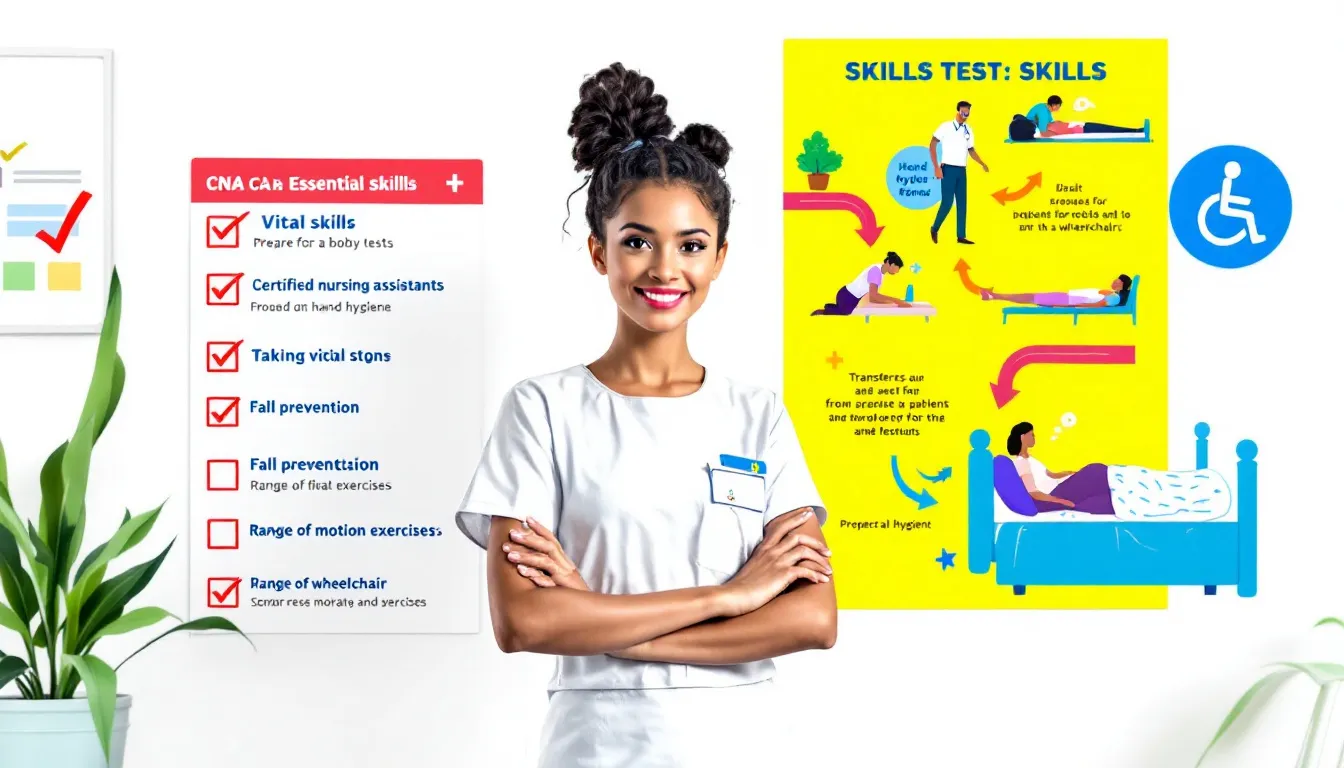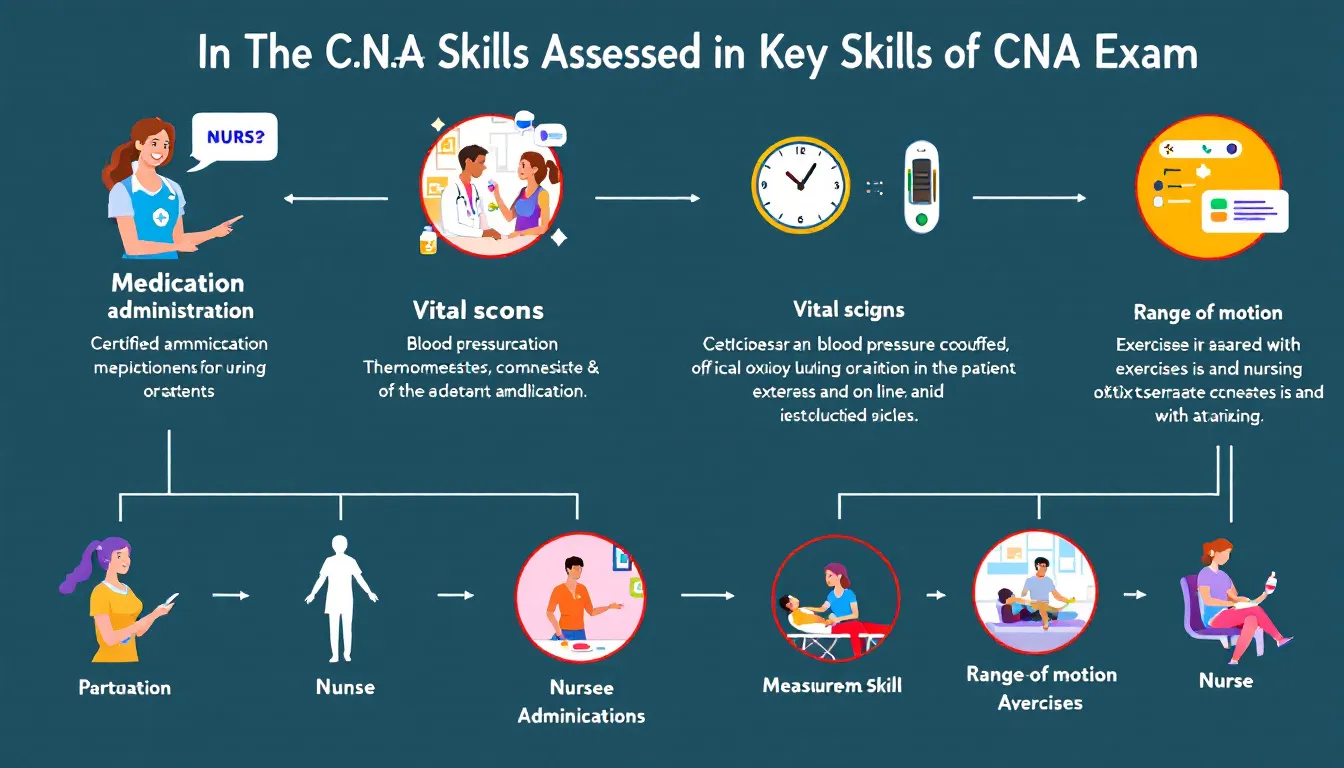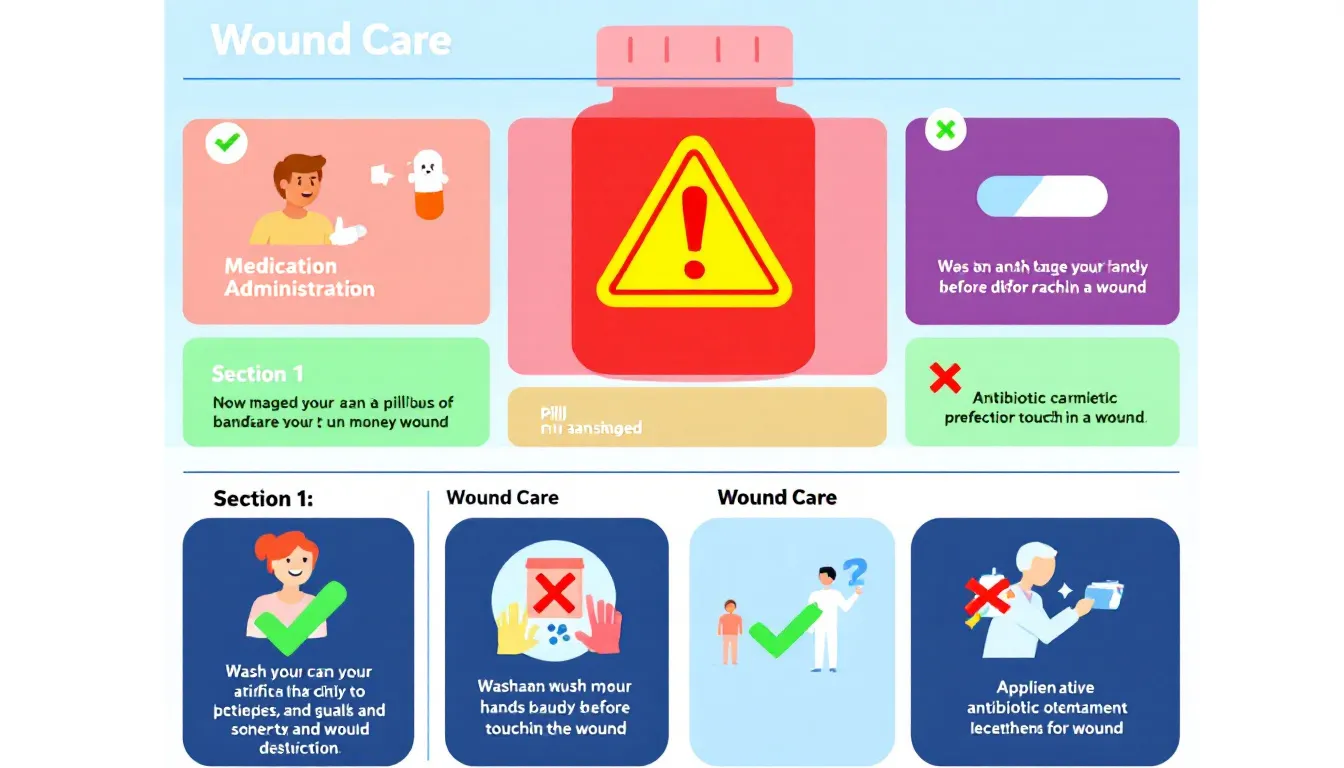Top Skills for CNA Exam Success: Essential Tips and Strategies
Wondering what skills you need to master for the CNA exam? This guide breaks down the key skills for CNA exam success, from hand hygiene to measuring vital signs, so you can prepare effectively and confidently.
Key Takeaways
- The CNA skills test evaluates essential practical abilities, including hand hygiene, measuring vital signs, and patient care skills, which are critical for effective patient care.
- Effective preparation strategies, such as creating a study schedule, utilizing practice tests, and engaging in study groups, enhance candidates’ confidence and knowledge for the CNA exam.
- Managing test anxiety through relaxation techniques and maintaining a positive mindset are crucial for optimal performance on the day of the CNA skills test.
Introduction to the CNA Certification
The Certified Nursing Assistant (CNA) certification is a vital credential for anyone aspiring to work as a nursing assistant in the healthcare field. Earning your CNA certification demonstrates that you have acquired the essential knowledge and practical skills needed to provide safe, effective patient care under the supervision of registered nurses and other healthcare professionals. To become a certified nursing assistant, you must pass the CNA exam, which includes both a written test and a clinical skills test—often referred to as the CNA skills test. This process ensures that you are fully prepared to meet the demands of the role, from understanding patient needs to performing hands-on care. Achieving CNA certification is not only a significant milestone in your healthcare career but also a testament to your commitment to delivering high-quality care and making a positive impact on patients’ lives.
Understanding the CNA Skills Test

The CNA skills test is a pivotal part of the certification process for aspiring certified nursing assistants. This exam is required for anyone seeking to become a nurse aide. It is meticulously designed to assess the practical abilities necessary for providing effective patient care. It consists of both a written or oral portion and a practical skills demonstration, ensuring that candidates are well-rounded in their knowledge and application of cna training. The cna test evaluates these essential skills.
During the skills portion, candidates are required to perform between three to six skills selected by the testing administrator. Testing agencies administer the CNA certification exam and oversee the skills assessment procedures, ensuring that all aspects of the process are conducted fairly and consistently. These skills are critical for patient care and include tasks such as measuring vital signs, ensuring proper hand hygiene, and assisting with daily living activities. The written test complements this by testing your understanding of patient care principles, safety protocols, and ethical considerations through multiple-choice questions, including a clinical skills test and a skills exam.
Passing the CNA exam is a critical step toward achieving cna certification and starting a career as a certified nursing assistant. The evaluation process varies by state, but the core competencies remain consistent, focusing on critical tasks that CNAs perform daily. In most states, the CNA exam requirements and procedures are similar, with only minor variations. This certification not only validates your skills but also opens up numerous opportunities in the healthcare field. Understanding the structure and expectations of the CNA skills test can significantly enhance your preparation and boost your confidence for the cna certification exam.
CNA Exam Format and Content
The CNA exam is structured to assess both your theoretical knowledge and your practical abilities as a nursing assistant. It consists of two main components: the written examination and the skills test. The written test is typically made up of multiple-choice questions that evaluate your understanding of nursing concepts, patient care procedures, and safety protocols. This portion ensures you have the foundational knowledge required for the role.
The clinical skills test, or skills portion, is where you demonstrate your ability to perform essential nursing skills in a real-world setting. During this part of the exam, you may be asked to perform tasks such as proper hand hygiene, measuring vital signs like blood pressure and radial pulse, and assisting patients with daily living activities. An evaluator will observe as you perform each skill, assessing your technique, accuracy, and ability to provide safe patient care. The skills test is designed to confirm that you can apply your knowledge effectively and confidently in a clinical environment, ensuring you are ready to meet the needs of patients as a certified nursing assistant.
Key Skills Assessed in the CNA Exam

The CNA skills test evaluates a range of practical abilities essential for effective patient care. These key skills ensure that nursing assistants can provide high-quality support in various healthcare settings. The evaluation process varies by state, but the core competencies remain consistent, focusing on critical tasks that CNAs perform daily. In other states, certification requirements may differ, such as only being necessary for certain care facilities like nursing homes.
Among the essential skills assessed are hand hygiene, measuring vital signs, patient care skills, mobility assistance, and infection control. Each of these areas is crucial for maintaining patient health and safety, and candidates must demonstrate proficiency in these tasks to pass the CNA exam.
Let’s delve into each of these key skills to understand their importance and the correct procedures.
Hand Hygiene
Hand hygiene is a foundational skill in healthcare, crucial for preventing the spread of infections. During the CNA exam, candidates must demonstrate proper hand hygiene techniques, using either soap and water or hand sanitizer. This skill is critical, and failing to perform it correctly at the appropriate times can lead to automatic disqualification.
The steps for proper hand hygiene involve wetting hands, applying soap, scrubbing all surfaces for at least 20 seconds, rinsing, and drying with a clean towel. This process must be performed meticulously, as it is a common reason for failing the skills test if not done correctly.
Mastery of hand hygiene is not just about passing the exam; it’s about ensuring patient safety and infection control in real-world settings.
Measuring Vital Signs
Measuring vital signs is a critical component of patient assessment and care. During the CNA exam, candidates are evaluated on their ability to accurately measure and record blood pressure, pulse, and respiration rates. These vital signs are key indicators of a patient’s health status and must be measured correctly to ensure proper care.
Candidates use a sphygmomanometer and stethoscope to measure blood pressure accurately, following precise steps. Measuring the radial pulse involves placing two fingers on the wrist and counting the beats for a specified period. Similarly, respiration rates are assessed by observing the patient’s chest rise and fall, counting the breaths for one minute. It is important to follow the correct procedure for each measurement to ensure accuracy and patient safety.
Proficiency in these tasks is essential for passing the CNA skills test and providing effective patient care.
Patient Care Skills
Patient care skills are at the heart of a CNA’s responsibilities. These skills include:
- Assisting with daily living activities such as bathing, dressing, and feeding
- Ensuring patient comfort and dignity
- Effective communication with patients, which helps build rapport and ensures that patients understand the care being provided.
During the CNA exam, candidates must demonstrate their ability to perform these tasks accurately and compassionately. During the skills demonstration, candidates often perform these tasks on a volunteer or simulated person to replicate real patient care scenarios. This involves not only technical proficiency but also an empathetic approach to patient care. Mastery of these skills is essential for passing the skills test and succeeding in a CNA career.
Mobility Assistance
Assisting patients with mobility is another key skill evaluated in the CNA exam. Techniques for effective mobility assistance include using gait belts and ensuring the patient’s safety during transfers. Proper body mechanics are crucial to prevent injury to both the patient and the caregiver.
The use of a gait belt is a common method for safely assisting patients during transfers. Additionally, candidates must demonstrate the ability to ensure patient safety, such as using bed rails when leaving a patient alone. These skills are vital for maintaining patient mobility and preventing falls or injuries.
Infection Control
Infection control is paramount in healthcare settings to prevent the spread of disease. Proper use of personal protective equipment (PPE) is a crucial aspect of maintaining infection control.
During the CNA exam, candidates must demonstrate their knowledge and application of infection control procedures, including the correct use of PPE and maintaining hygiene standards. This skill is essential for protecting both patients and healthcare workers.
Effective Preparation Strategies

Effective preparation is key to passing the CNA exam with confidence. Tailored learning resources, such as online courses and CNA flashcards, can significantly aid in memorizing critical information and concepts. Enrolling in a CNA training course or online prep course provides structured learning and ensures comprehensive preparation for the exam. Engaging in thorough preparation helps candidates feel more confident and prepared on exam day.
Developing a structured study plan, utilizing practice tests, and forming study materials groups are all effective strategies for mastering the required skills. A combination of these methods ensures comprehensive coverage of necessary topics and enhances information retention.
Creating a Study Schedule
Creating a well-structured study schedule is crucial for systematic preparation. Starting your studies well in advance of the exam date enhances retention and effectiveness. A structured study plan ensures that all skills and knowledge areas are covered without overwhelming the student.
Establishing specific study times and adhering to the schedule helps ensure comprehensive coverage of necessary topics. This approach allows candidates to balance their study sessions and avoid last-minute cramming, leading to better preparation and confidence.
Utilizing Practice Tests
Utilizing a practice test is an effective way to prepare for the CNA exam. Engaging in a practice test allows candidates to become accustomed to the exam’s structure and pinpoint specific skills they need to improve. Repeatedly taking practice tests not only familiarizes you with the test format but also tracks your progress over time.
Candidates should follow a strategic approach when taking a practice test, focusing on understanding underlying concepts instead of merely memorizing answers. This method helps identify areas needing improvement and ensures a well-rounded preparation.
Forming Study Groups
Forming study groups can be a valuable strategy for CNA exam preparation. Collaborating in study groups enables learners to share resources and support each other in mastering the skills needed for the test. This collaborative approach can enhance understanding through discussions and shared insights among peers.
Study groups also provide a platform for practicing skills and receiving feedback from instructors, which can be incredibly helpful in mastering the required competencies in a training program. This peer support system can make the preparation process more engaging and effective.
Leveraging Online Resources
Leveraging online resources can significantly enhance your preparation for the CNA exam. Video tutorials are available to help candidates visually understand CNA exam concepts, providing a practical perspective on various skills. Interactive quizzes serve as a tool for evaluating knowledge and improving exam readiness.
Online prep courses often include comprehensive lessons and practice questions tailored for various learning styles, making them an invaluable resource for CNA candidates. Utilizing these online tools can provide a more flexible and effective study experience.
Staying Focused and Motivated
Staying focused and motivated is key to success when preparing for the CNA exam, especially the skills test. As a certified nursing assistant candidate, it’s important to make the most of your training program by actively engaging with study materials and practicing the key skills that will be tested. Forming a study group with fellow CNA candidates can provide valuable support, allowing you to share tips, practice motion exercises, and reinforce infection control techniques like proper hand hygiene. Regular practice not only builds your confidence but also helps you master the skills needed to pass the CNA test. Keep your motivation high by setting clear, achievable goals—such as passing the exam on your first attempt—and reminding yourself of the rewarding career opportunities that await you as a nursing assistant. With dedication, practice, and the right mindset, you’ll be well-prepared to succeed on exam day.
On-the-Day Tips for the CNA Skills Test

On the day of the CNA skills test, staying calm and focused is essential. Deep breathing exercises help manage anxiety and maintain focus before and during the test. It’s important to bring all necessary identification and required documentation to the testing center to ensure a smooth check-in process.
Being well-prepared and confident can significantly impact your performance. Remember, exam results will be available a few hours after finishing the CNA skills test, so stay positive and focused throughout the process.
What to Bring
Knowing what to bring on exam day is crucial for a smooth experience. It’s necessary to bring an official ID that matches the name on the test registration confirmation. Some states require a Social Security card to be brought to the testing center.
Items like wallets, reference materials, and mobile phones are prohibited in the examination area. Ensuring you have the correct items and leaving prohibited items behind will help you stay focused and avoid any last-minute issues.
Managing Test Anxiety
Managing test anxiety is essential for optimal performance. Test anxiety is a common phenomenon experienced by candidates, where fear and nervous can impact their performance during an exam. Practicing relaxation techniques such as deep breathing and visualization before and during the exam can help calm nerves.
Maintaining a positive mindset and encouraging self-talk prior to the exam can bolster confidence and mitigate anxiety. Adequate preparation and practice can also significantly reduce anxiety, making candidates feel more competent and confident on test day.
Final Preparation
As you approach the final stages of your CNA skills test preparation, it’s essential to ensure you have thoroughly mastered all the required skills, including oral care, foot care, and the safe use of a gait belt. Take time to review the candidate handbook provided by your testing center, as it contains important details about the skills exam format, time limits for each skill, and specific procedures you’ll be expected to perform. Practicing under timed conditions can help you get comfortable with the pace of the test and reduce any nervousness you may feel. Make sure you understand the testing center’s policies, including what to bring on exam day—such as a watch with a second hand and appropriate attire. By focusing on these final details and continuing to practice your skills, you’ll enter the exam with greater confidence and a clear understanding of what to expect.
Common Mistakes to Avoid

Avoiding common mistakes can make a significant difference in your performance during the CNA skills test. One common mistake is not admitting a mistake and requesting to repeat a skill, which can lead to lost points. Being honest about your errors and asking for another chance can demonstrate your commitment to accuracy and competency.
Post-Exam Steps
After completing the CNA skills test, there are several important steps to take. Exam results are usually sent out within five to seven business days after the evaluation. The official Score Report will indicate whether your performance was Satisfactory or Unsatisfactory for each skill, including whether you achieved a passing score.
If you have failed the skills evaluation, the official report will outline specific skills that need improvement. You can retake the CNA exam up to three times within a specified timeframe to retain eligibility.
Once both parts of the CNA exam are passed, it takes about three to four weeks for the certification to be mailed to you.
Career Opportunities
Passing the CNA certification exam opens the door to a wide range of career opportunities in the healthcare industry. Certified nursing assistants are in high demand and can find rewarding positions in hospitals, nursing homes, assisted living facilities, and private home care settings. As a CNA, you’ll play a crucial role in supporting patients’ daily needs, working alongside other nursing staff, and making a meaningful difference in people’s lives. The skills and experience you gain as a nursing assistant can also serve as a foundation for further education and career advancement, such as becoming a licensed practical nurse (LPN) or registered nurse (RN). With the growing need for compassionate and skilled nursing assistants, CNA certification is a valuable credential that can lead to a stable, fulfilling, and dynamic career in healthcare.
Summary
In conclusion, passing the CNA exam requires a thorough understanding of the key skills assessed, effective preparation strategies, and practical tips for exam day. From mastering hand hygiene to measuring vital signs, each skill plays a crucial role in providing high-quality patient care. Utilizing online resources, creating a structured study schedule, and forming study groups can enhance your preparation and boost your confidence.
Remember, the journey to becoming a certified nursing assistant is challenging but rewarding. Stay focused, practice diligently, and approach the exam with confidence. With the right preparation and mindset, you can achieve your CNA certification and embark on a fulfilling career in healthcare.
Frequently Asked Questions
What are the key components of the CNA exam?
The key components of the CNA exam are the written or oral portion, which features multiple-choice questions, and the practical skills demonstration, where candidates must perform three to six skills chosen by the examiner. Success in the exam hinges on preparation for both segments.
How important is hand hygiene during the CNA skills test?
Hand hygiene is critically important during the CNA skills test, as failure to perform it correctly can lead to failing the test. Ensure you follow the specific steps for proper hand hygiene, using soap and water or hand sanitizer as needed.
What strategies can help me prepare effectively for the CNA exam?
To prepare effectively for the CNA exam, it is crucial to create a structured study schedule, utilize practice tests, and engage in study groups. Additionally, using tailored learning resources like online courses and flashcards will enhance your comprehension and retention.
What should I bring to the CNA skills test?
You must bring an official ID that matches the name on your test registration, and some states may also require your Social Security card. Remember, wallets and mobile phones are not permitted in the examination area.
What should I do if I fail the skills evaluation portion of the CNA exam?
If you fail the skills evaluation portion of the CNA exam, review the official report for skills that need improvement and remember that you may retake the exam up to three times within the designated timeframe to maintain your eligibility. It is crucial to prepare thoroughly for the retake to enhance your chances of success.

